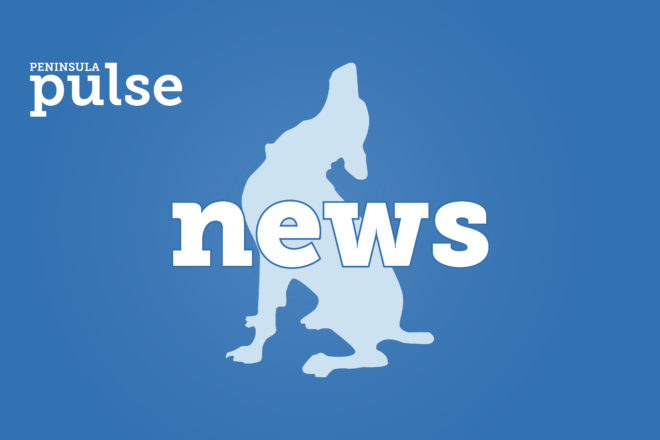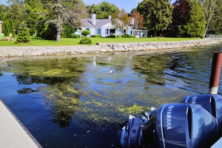Residents Say ‘No’ to Taxing for Roads
- Share
- Tweet
- Pin
- Share

Final budget hearing and 2024 budget/tax levy vote Dec. 11
The Town of Gibraltar packed the house last week before Thanksgiving to ask residents for a $400,000 tax levy increase for roads.
Electors said “no” with a 71-37 vote.
“Am I disappointed that democracy wins? No. Absolutely not,” said Travis Thyssen, town administrator, the morning after the Nov. 20 special town meeting. “The people do have a voice. They came in and spoke and told the board what they wanted.”
The state allows towns to hold special meetings to ask electors if they want to exceed a state-imposed cap on the property tax levy. In Gibraltar’s case, the allowable property tax increase for 2024 was 1.30%, or about $21,333. The town wanted to increase the levy by $421,333, with that additional $400,000 reserved for road construction and maintenance.
“I guess I wasn’t surprised at the outcome because I had enough phone calls over the week, and questions,” said Town Board Chair Steve Sohns, the day following the vote. “It’s unfortunate, but I get it.”
The town currently raises $400,000 annually for roads through its one-year-old traffic utility fee ordinance. The fee, in essence, charges all properties for use of the roads, including those that are typically exempt from taxes or fees, such as nonprofits, the Gibraltar School District, or Peninsula State Park.
But the Wisconsin Supreme Court struck down in June an ordinance in Outagamie County’s Town of Buchanan. That decision caused the Gibraltar town board to revisit its own policy. While their attorneys are telling them it’s still legal, Sohns said they are not convinced that’s true.
If the traffic utility does go away, the money earmarked for roads goes with it – thus, the board’s attempt to put the $400,000 one time on the tax levy and reserve it thereafter for road projects.
The takeaways for both Thyssen and Sohns from the Nov. 20 meeting was that electors wanted the town to slow down on projects and not spend money urbanizing Fish Creek. They also thought the traffic utility was the more fair option because it charged the fee to all properties – unlike the property tax that exempts nonprofits or state parks or school districts.
“A lot of people feel nonprofits should be paying something toward our roads,” Sohns said. “That’s the one thing I heard loud and clear that the utility fee did accomplish.”
The vote was also beset by poor timing, Sohns said. Property values are rising following a town revaluation. Taxpayers will also see the impact of the $29.8-million capital improvement referendum the Gibraltar School District passed this year. Other expensive projects are also coming down the line, Sohns said, such as for broadband.
Not even Sohns voted in favor of the $400,000 levy increase.
“I didn’t vote for it myself last night because I guess I agreed with too many people,” he said. “We were put on the spot and asked if we had done everything we could to cut things in the budget and I truly believed there were things we needed to cut back on.”
Sohns said those included the reconstruction of Hill Street/Bluff Lane, which came in about $40,000 below estimate, in addition to some carryover funding that could be used to defray expenses.
“I would say about $70,000 could have been cut out of the budget to tighten things up,” he said.
Still, a little over $1 million is needed for the Hill Street/Bluff Lane project that was supposed to start this week.
“We will have to figure out a way to pay for that project,” Thyssen said. “It was funded by the traffic utility fee, and if that goes away, we will have to borrow.”
It certainly appears the traffic utility fee ordinance will go away, according to Sohns. One new town board member elected in April campaigned on the fee’s elimination – Tom Birmingham – and neither did Sohns vote for it when it passed in 2022. Sohns said then, and now, he thought the fee circumvented the taxpayers by raising additional money without having to ask voters for the increase.
“So it’s ironic that last night [Nov. 20] we went to them for an increase, and they shot it down,” Sohns said. “There were reasons for it and I get it.”
The town board will meet again on Dec. 11 for a hearing on the $4,481,562, 2024 budget, and the allowed levy increase of 1.3% (which brings the total levy the town will receive from property owners to $2,949,502 in 2024).
Thyssen said the traffic utility fee will also be on a board agenda in December.
“It’s now become the elephant in the room,” he said.
Sohns said they may have to wean themselves off the fee by collecting one final payment of $200,000 in 2024, versus the two payments totaling $400,000.
“The vote will be to get rid of it immediately or get rid of it after one more payment,” Sohns said. “But somehow, we have to get rid of it so it’s out of our system.”


